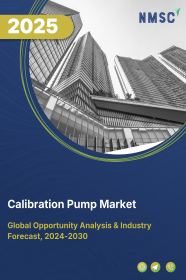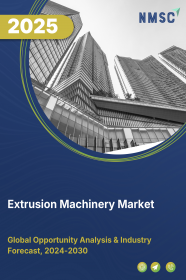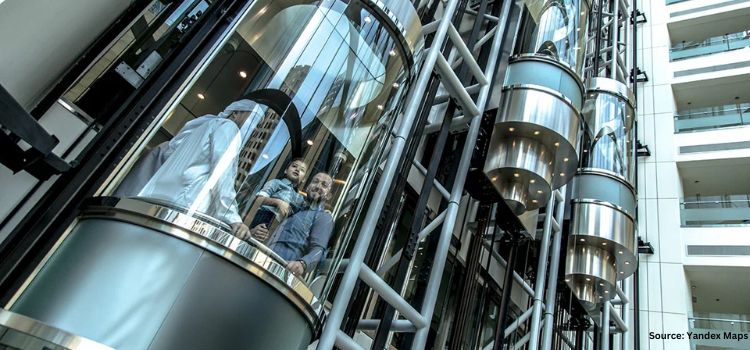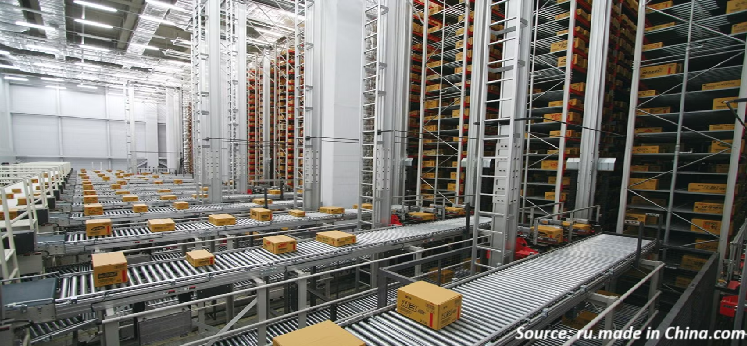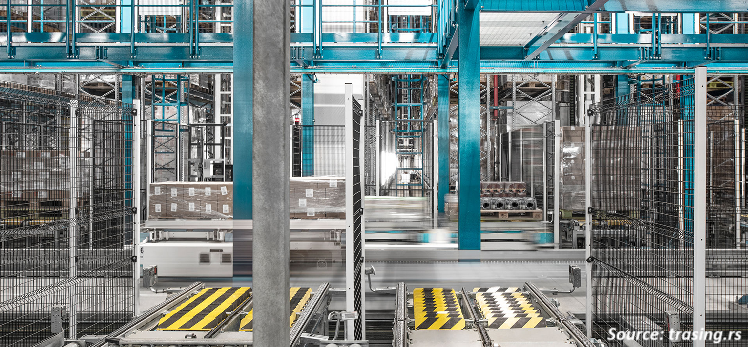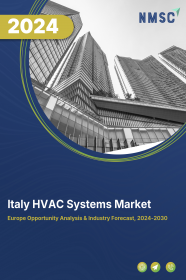
Italy HVAC Systems Market by Equipment (Cooling Equipment, Heating Equipment, and Ventilation), by Implementation Type (New Construction and Retrofit), and by End User (Residential, Commercial, and Industrial) - Opportunity Analysis and Industry Forecast, 2024– 2030
Industry: Construction & Manufacturing | Publish Date: 13-Nov-2024 | No of Pages: 119 | No. of Tables: 87 | No. of Figures: 52 | Format: PDF | Report Code : CM1928
US Tariff Impact on Italy HVAC Systems Market
Trump Tariffs Are Reshaping Global Business
Market Definition
The Italy HVAC System Market size was valued at USD 4.50 billion in 2023, and is predicted to reach USD 6.49 billion by 2030, at a CAGR of 4.8% from 2024 to 2030.
HVAC (Heating, Ventilation, and Air Conditioning) refers to the technology and systems used in buildings to regulate indoor environmental conditions such as temperature, humidity, and air quality to ensure comfort and safety for occupants. Heating systems provide warmth during colder months, ventilation systems circulate and replenish indoor air, and air conditioning systems cool and dehumidify indoor air during warmer months.
HVAC systems offer several advantages, including improved occupant comfort and health, increased energy efficiency leading to cost savings, better indoor air quality through filtration and ventilation, precise temperature control for enhanced productivity in commercial settings, and protection of building infrastructure from extreme weather conditions. Additionally, these systems can be designed to meet specific requirements, contributing to sustainability goals by reducing carbon emissions and promoting eco-friendly practices in building operations.
Growing Demand for Improved Indoor and Outdoor Air Quality Drive the HVAC System Market
The burgeoning demand for heightened indoor and outdoor air quality is a primary driver behind the escalating growth trajectory of the HVAC system market. Increasing awareness regarding the pivotal role of air quality compels both residential and commercial property owners to prioritize investments in HVAC systems capable of effectively filtering and purifying indoor air while simultaneously mitigating outdoor emissions.
Consequently, there is a noticeable uptick in the demand for advanced HVAC systems integrating state-of-the-art filtration technologies such as HEPA filters and UV-C light sterilization, designed to eradicate pollutants, allergens, and pathogens from indoor environments. This prevailing trend incentivizes HVAC manufacturers to innovate and introduce novel solutions focused on enhancing air quality, thereby fueling the expansion of the HVAC system market.
Environmental Concerns Drive Growth in the HVAC Systems Industry
The HVAC systems industry is witnessing notable growth driven by environmental concerns. With increased awareness of climate change, air pollution, and ozone depletion, there is growing pressure for sustainable practices and regulatory compliance. Governments globally are imposing regulations to reduce the environmental impact of HVAC systems, prompting manufacturers to invest in eco-friendly technologies.
Moreover, environmental considerations are pivotal in driving growth within the HVAC systems sector. Heightened awareness surrounding climate change, air pollution, and ozone depletion has spurred demand for sustainable practices and regulatory measures. Governments worldwide are implementing mandates to mitigate the environmental impact of HVAC systems, catalyzing the development and adoption of eco-conscious technologies.
Regulatory Compliance Associated with HVAC Systems Impede the Market Expansion
Regulatory compliance represents a formidable barrier to the expansion of the HVAC sector. Comprising a plethora of mandates from governmental bodies and industry entities, compliance entails adherence to a myriad of laws, regulations, and standards.
These encompass diverse facets such as energy efficiency, emissions, refrigerants, and construction codes. Achieving compliance necessitates substantial investments in research, development, and technological advancements to ensure alignment with prescribed norms. However, for smaller enterprises or those constrained by limited resources, navigating this intricate regulatory terrain proves daunting, potentially obstructing market entry or growth.
Furthermore, compliance endeavors often divert attention and resources away from innovation and product enhancement, as companies prioritize meeting regulatory requisites over investing in novel technologies or refining existing ones. Consequently, regulatory adherence acts as a deterrent to HVAC market expansion, imposing additional costs and intricacies on industry stakeholders and impeding their ability to fully exploit market prospects.
Integration of Solar-Powered HVAC Systems Creates Opportunity Growth for the Market
Solar-powered HVAC systems, utilizing photovoltaic technology to power heating, ventilation, and air conditioning operations, emerge as a promising avenue for market expansion within the HVAC industry.
Through the deployment of these systems, equipped with solar panels positioned on rooftops or designated areas, consumers can substantially decrease reliance on grid electricity, resulting in notable energy cost reductions. With ongoing advancements in solar panel efficiency, energy storage capabilities, and system integration techniques, solar-powered HVAC solutions are progressively becoming economically viable.
Furthermore, these systems contribute to carbon emission reduction and advocate sustainability, in harmony with escalating environmental concerns and regulatory standards globally. The growing demand for energy-efficient and eco-friendly alternatives among businesses and homeowners accentuates the compelling opportunity for market growth through the widespread adoption of solar-powered HVAC systems, fostering innovation and investment in renewable energy technologies within the HVAC sector.
Competitive Landscape
The market players operating in the Italy HVAC System market include Midea Group Co Ltd, Daikin Industries Ltd., Gree Electric Appliances Inc., Johnson Controls International Plc., Carrier Global Corporation, Samsung Electronics Co., Ltd., Trane Technologies Plc., LG Electronics Inc., Panasonic Holdings Corporation, Lennox International Inc. and others.
Italy HVAC System Market Key Segments
By Equipment
-
Cooling Equipment
-
Unitary Air Conditioners
-
Variable Refrigerant Flow Systems (VRF)
-
Chillers
-
Room Air Conditioners
-
Coolers
-
Cooling Towers
-
-
Heating Equipment
-
Heat Pumps
-
Furnaces
-
Unitary Heaters
-
Boilers
-
-
Ventilation
-
Air-handling Units (AHUs)
-
Air Filtration Systems
-
Ventilation Fans
-
HRVs & ERVs
-
Air Purification Systems
-
Others
-
By Implementation Type
-
New Construction
-
Retrofit
By End User
-
Residential
-
Commercial
-
Industrial
REPORT SCOPE AND SEGMENTATION:
|
Parameters |
Details |
|
Market Size in 2023 |
USD 4.50 Billion |
|
Revenue Forecast in 2030 |
USD 6.49 Billion |
|
Growth Rate |
CAGR of 4.8% from 2024 to 2030 |
|
Analysis Period |
2023–2030 |
|
Base Year Considered |
2023 |
|
Forecast Period |
2024–2030 |
|
Market Size Estimation |
Billion (USD) |
|
Growth Factors |
|
|
Companies Profiled |
10 |
|
Market Share |
Available for 10 companies |
|
Customization Scope |
Free customization (equivalent up to 80 working hours of analysts) after purchase. Addition or alteration to country, regional, and segment scope. |
|
Pricing and Purchase Options |
Avail customized purchase options to meet your exact research needs. |
KEY PLAYERS
-
Midea Group Co Ltd.
-
Daikin Industries Ltd.
-
Gree Electric Appliances Inc.
-
Johnson Controls International Plc.
-
Carrier Global Corporation
-
Samsung Electronics Co., Ltd.
-
Trane Technologies Plc.
-
LG Electronics Inc.
-
Panasonic Holdings Corporation
-
Lennox International Inc.

















 Speak to Our Analyst
Speak to Our Analyst



